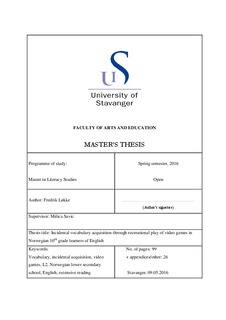| dc.description.abstract | As Norwegian youth have been found to spend almost two hours a day playing video games (Medietilsynet 2014), the current study seeks to investigate the effects this recreational gaming might have on English vocabulary acquisition. The four research questions, focusing respectively on the participants’ vocabulary gains, attitudes toward learning through video games, and learning strategy use while gaming, were addressed through a mixed methods approach, in which three data collection tools were employed. First, a vocabulary test was administered in order to measure the 22 Norwegian 10th grade participants’ incidental vocabulary acquisition through their playing of the video game Bastion. Following, the participants completed a short questionnaire, which mapped out their gaming proficiency, so as to link their perceived difficulty of the game to their vocabulary test scores. Finally, the participants were interviewed in focus groups, in order to elicit their attitudes toward using video games for learning, as well as the vocabulary learning strategies they employed while gaming.
The popularity of video games has increased drastically over the past decades. As a result, researchers have focused their attention on investigating the learning outcomes that can be achieved through video games. In the educational context, Ranalli (2008) found that the combination of The Sims and complementary materials lead to some vocabulary acquisition, while results from Vahdat and Behbahani’s study (2013) showed that more vocabulary was acquired through gaming than by means of what the researchers termed traditional vocabulary instruction. In the out-of-school context, two Swedish studies (Sundqvist and Wikström 2015; Sylvèn and Sundqvist 2012) showed that the amount of gaming their participants did in their spare time had a positive connection to both their vocabulary size and their English test scores. Inspired by the positive results of these studies, as well as by the positive vocabulary learning outcomes obtained through extensive reading (Mason and Krashen 1997; Pellicer-Sánchez and Schmitt 2010), the current study aimed to measure whether out-of-school gaming of the video game Bastion over a four-week period, with no explicit focus on language, could lead to incidental acquisition of ten vocabulary items from the game.
The results of the vocabulary test showed that the participants were able to achieve an average score of 6.77 out of 13 (53.1%), which showed that incidental vocabulary acquisition through the playing of Bastion was indeed possible. Additionally, the results demonstrated that more meaning (67.3%) than form (42.6%) of the target vocabulary was acquired by the study’s participants. In regards to the connection between gaming proficiency and vocabulary test scores, those who perceived the game as easy achieved higher mean scores (9.00) than those who thought it was a bit difficult (6.00), suggesting that the difficulty level of video games might have a significant impact on their usefulness for learning.
As for the participants’ attitudes toward using video games for learning, the focus group interviews showed their tendency to think that commercial video games would not produce good learning outcomes. Rather, games would have to be made for learning, and preferably require mastering certain skills or knowledge in order to progress the plot. In terms of learning strategies, guessing from context was found to be the most common strategy employed by the participants. Additionally, some participants said that they asked other players for explanations in multiplayer games, or that they used Google to find the meaning of unknown words. Overall, the game itself was perceived as more important than the language by the study’s participants, and only a few participants showed an awareness of the learning strategies they used while gaming.
The conclusions drawn by the current study can be further explored. Research on extensive reading found that more knowledge of form was acquired than of meaning (Pigada and Schmitt 2006; Pellicer-Sánchez and Schmitt 2010). The fact that more knowledge of the words’ meaning was acquired in the current study might imply that video games can be useful for acquiring a type of knowledge that is difficult to gain through reading (Lawson and Hogben 1996). However, more research is required to see whether similar results would be obtained through a different vocabulary test or with a larger sample. In terms of implications for teaching, the fact that only some participants were aware of their learning strategy use shows that video games is a language resource that can be exploited in school, by providing learners with appropriate strategies for use when gaming, thus facilitating learner autonomy during a major spare-time activity. | nb_NO |

